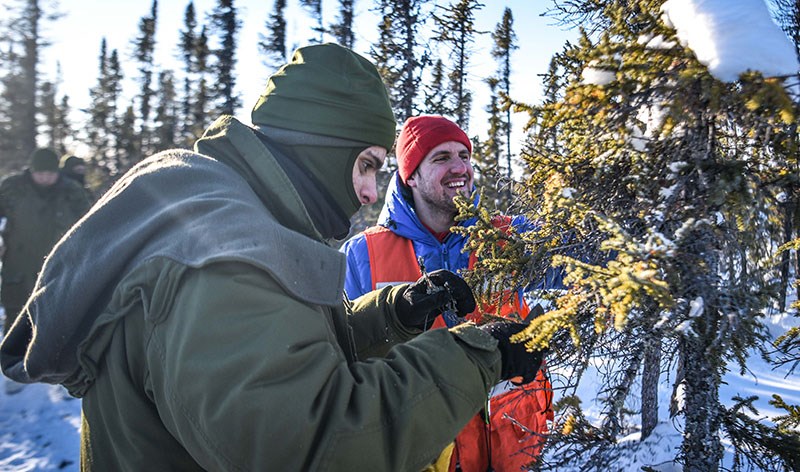A dozen Canadian Rangers from Gillam and Churchill participated in a winter training exercise with 70 Canadian Armed Forces reservists Feb. 14-23.
Exercise Arctic Bison is the 38 Canadian Brigade Arctic Response Company Group’s (ACRG) major winter training exercise and this year it started in Gillam and continued via snowmobile to Churchill.
Six members of the Gillam Ranger Patrol and six from the Churchill Canadian Ranger Patrol guided the soldier during the snowmobile portion of the exercise and also provided winter survival training.
“Since this is where our patrols are we have intimate knowledge of the area and land, and we passed that knowledge on to the 38 CBG soldiers so they can have better success during their exercise,” said Canadian Ranger Sgt. John Watt, patrol commander for the Gillam Canadian Ranger Patrol, in a press release. “As well, we travel fairly extensively by snowmobile as a patrol so we know these trails and routes and of course snowmobile maintenance. A major portion of what the Canadian Rangers did during these exercises is mentor these soldiers. Whether it is assisting them with snowmobile maintenance or repairs or giving them tips on how to ride better or advice on what to expect on the trail. This was our opportunity to show other units what Canadian Rangers bring to the Canadian Armed Forces.”
The Rangers spent Feb. 19 providing wilderness survival training in M’Clintock, instructing the reservists in basic snowmobile maintenance, building austere shelters, using basic field tools like axes and saws, building signals, starting fires and trapping and cleaning wild animals for food.
“The survival training was a great opportunity for the Canadian Rangers to pass on their skills and knowledge to the soldiers,” said Watt, adding that this experience was also a great learning opportunity for the Rangers. “This is what Canadian Rangers do: survive in the wilderness. We do not often have the chance to work directly with other units within the Canadian Armed Forces but it is important that we do. This allowed the Canadian Rangers to understand how these units work and when we do support them, whether it is on an exercise or domestic operation, we are better equipped to communicate and liaise with them.”
Canadian Rangers are are class A part-time reservists in the Canadian Army Reserve Force. There are about 5,000 of them in five patrol groups covering more than 400 Canadian communities. Their mission is to provide lightly equipped and self-sufficient mobile forces to support the Canadian Armed Forces sovereignty and domestic missions. They often operate in sparsely settled northern, coastal and isolated areas that can’t be covered conveniently or economically by other Canadian Armed Forces subcomponents. As such, operating in remote wilderness areas is second nature to them, and they often take part in search and rescue operations.Western Canada’s Rangers are part of the 4th Canadian Ranger Patrol Group.




